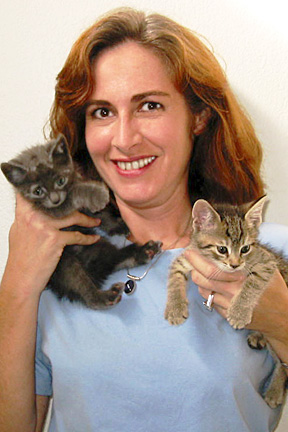
These are just two of the many kittens cared for by Jennifer Kishimori of Cat Friends. The Hawaiian Humane Society provides sterilization of the youngsters at no charge.
Cat control needs
human help
The cat population escalates every summer as thousands of litters of feral kittens are born. While the size of Hawaii's feral cat population is unknown, the Hawaiian Humane Society on Oahu received more than 1,000 of them in June. And 17 percent of Oahu households admit to feeding a cat they did not own.
Cat factsDon't abandon your cat: Releasing a pet cat in a feral colony is a violation of the animal desertion law. Domestic cats may be rejected or attacked by the colony.Microchip Madness: In August only, cat owners can have their cats microchipped for just $5. For a list of participating veterinary clinics call 356-2290.
|
Trap-Neuter-Return-Manage Programs -- pioneered in Europe and used across the United States -- are a humane and effective way to improve these animals' quality of life and reduce populations. But consistent monitoring and lifelong commitment are required to effectively manage a colony.
The program relies on the ongoing dedication and compassion of caregivers. Community volunteers who use the humane society's free feral sterilization services agree to manage colonies, ensure veterinary care and help place kittens in homes. They also are encouraged to secure the permission of landowners and residents to keep watch over cats on private property, and to keep feeding areas tidy.
"TNRM helps to gradually decrease the size of these colonies as the cats live out their natural lives without reproducing," says Pamela Burns, Hawaiian Humane Society CEO. "As a result, millions of unwanted kittens have been spared from life on the streets and have not become a nuisance in neighborhoods."
Caregivers win the confidence of these cats through regular feeding. Eventually the cats can be lured into humane traps and brought to the humane society for sterilization. A microchip ID is implanted for $5. While under anesthesia, the cat's ear tip (left for males, right for females) is docked for identification purposes.
"All cats deserve loving, permanent homes with responsible caregivers who keep cats safely indoors and meet their special needs," Burns says. "The reality is that feral cats are un-socialized and cannot be handled or placed in a typical pet home. People who care can trap cats to have them sterilized and placed back in their environment to help decrease the population."
Kittens in good health that are at least 4 weeks old are placed in foster care through the humane society. The society encourages those who find kittens to care for them until 8 weeks of age, after which they can be made available for adoption.
Last year, the Hawaiian Humane Society worked with nearly 500 cat caregivers. Supported by community donations, the humane society was able to perform more than 2,800 free sterilizations in 2004. More than 20,000 surgeries have been performed since the program's inception in 1993.
Making this collaboration successful are compassionate individuals willing to make a difference, as well as community groups such as Cat Friends and Hawaii Cat Foundation that are working to reduce feral populations.
"Cat overpopulation is not going to be fixed overnight," says Jennifer Kishimori, president of Cat Friends. "No one organization can solve this problem alone. This is a community issue, and we need more caregivers and more veterinarians to get involved. If you've got a population explosion in your neighborhood or your housing development, it's a problem that needs your attention, and those feral cats are hoping for your help."
E-mail to Features Desk
[News] [Business] [Features] [Sports] [Editorial] [Do It Electric!]
[Classified Ads] [Search] [Subscribe] [Info] [Letter to Editor]
[Feedback]
